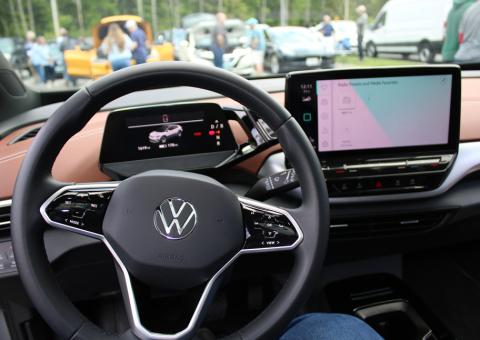One of the lingering hurdles affecting the widespread acceptance of electric vehicles (EVs) is the potential for having to replace the battery pack – and the costs associated with that. In fact, a recent study conducted by Cox Automotive showed that in 2022, 28% of those surveyed were concerned about the cost of a battery replacement. However, in most cases, EV batteries can be expected to last at least 10 years or 100,000 miles, and can last even longer with proper care.
How Long Do EV Batteries Last?
According to the National Renewable Energy Laboratory, EV owners can expect today’s batteries to last 12 to 15 years in moderate climates – longer than most people own their vehicles. It can be hard to put an exact number on EV battery life, and there are factors that EV owners can control and some they can’t. These include the age of the battery pack, the number of charging cycles, the ambient temperature, and driving/charging habits.
Factors That Affect EV Battery Lifespan
The age of the battery pack is a major factor affecting the lifespan of the EV battery. As batteries age, their ability to hold a charge decreases compared to when they were new. However, newer EV batteries offer improved technology that mitigates some of the effects of aging.
The number of charge cycles can also affect battery life, as the process of charging and depleting the battery takes a toll on its lifespan. Automakers continue to make improvements to the charging process to make charging gentler on the battery, thus extending its usable life.
In a similar vein, the practice of charging the battery before it is fully depleted (and not always charging it to 100%) minimizes the wear and tear on the unit. Just as an internal combustion engine operates best when the gas tank is kept between one-quarter and three-quarters full, EV batteries are at their best when kept between 20% and 80% of their maximum capable charge.
Did You Know? The United States mandates that EV manufacturers provide at least 8 years or 100,000 miles of warrantee battery coverage.
Temperature plays a significant role in battery life as well. Extreme cold can limit the speed at which EVs can charge (and limit their range as well), but heat has been proven to be the nemesis of EV batteries. In fact, even storing EVs at high temperatures can shorten battery life. Fortunately, today’s EVs feature thermal management systems that are designed to keep the battery pack at an optimal temperature.
Finally, the frequency with which fast DC charging is used can affect battery life. Though convenient and necessary for longer trips, fast charging causes additional wear and tear on the battery that will shorten its useful life. For this reason, DC fast charging stations are equipped with governors that slow the charge rate once the battery reaches 80% of its maximum capacity.
Tips to Extend EV Battery Life
By developing good habits, drivers can prolong their EV battery life. Here are some dos and don’ts.
- Avoid charging EV batteries beyond 80% of their maximum capacity whenever possible.
- Similarly, avoid letting the charge drop below 20%.
- Use a Level 1 or Level 2 charger to replenish the battery overnight.
- Limit DC fast charging to road trips.
- If possible, keep your car garaged, as this limits exposure to extreme heat and cold.
- Accelerate moderately to prevent wear and tear on the battery pack.
Finally, consult your owner's manual for charging best practices for your vehicle.
The Cost to Replace an EV Battery
Before getting into the cost of replacing an EV battery, there are a few things to note. Recurrent Auto examined a sample group of 15,000 EVs and found that fewer than 1.5% of batteries had been replaced (excluding recalls). Further, most battery replacements are made free of charge under manufacturer warranties.
That said, GreenCars estimated the replacement cost of a battery pack to be between $2,500 and $20,000; however, some manufacturers, such as Chevrolet and BMW, split the battery packs into modules so that consumers can replace only the faulty modules.
Where Do EV Batteries Go When They Die?
Contrary to popular belief, EV batteries the size of small refrigerators are not languishing in our landfills. Quite the opposite: Battery packs that have reached the end of their useful life can still be used as energy storage devices for residential solar arrays. Once a battery pack is no longer capable of providing energy, its components can be separated and recycled or otherwise reused.
Key Takeaways:
- EV batteries don’t just conk out – degradation is slow and constitutes a very gradual decrease in range.
- EV manufacturers are required to provide at least 8 years or 100,000 miles of warrantee battery coverage.
- According to BloombergNEF, the cost of batteries has dropped 89% since 2010, although the cost for some component elements have increased in recent years.



